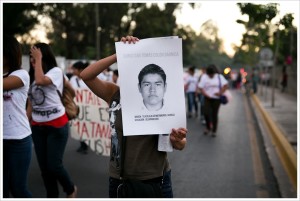Five Years Later, the Search Continues

Activists at a Global Action for Ayotzinapa demonstration in Oaxaca, Mexico. Credit: Montecruz Foto
By Megan DeTura
Today marks the fifth anniversary of the forced disappearances of 43 students from Ayotzinapa, Guerrero. In a case that has become a rallying cry throughout Mexico and the broader human rights community, the search for answers and justice continues as the fallout from a deeply inadequate government response intensifies.
In the immediate aftermath of the attack on the students, then President Enrique Peña Nieto launched an investigation that has since been sharply criticized by politicians, citizens, and most notably the Interdisciplinary Group of Independent Experts (or GIEI, by its Spanish acronym). GIEI’s two reports (issued in September 2015 and April 2016) indicated systemic delays and manipulation of evidence by government authorities, including their failure to follow up on suggested areas of investigation.
Since taking office on December 1, 2018, President Andrés Manuel López Obrador has taken a radically different stance toward the case from his predecessor. López Obrador, or AMLO as he is known, has prioritized uncovering the truth behind the 2014 case, taking steps to establish a truth commission led by Interior Deputy Secretary of Human Rights, Alejandro Encinas Rodríguez. The commission was inaugurated two days into AMLO’s administration and has since signed an agreement with the Office of the United Nations High Commissioner for Human Rights, which will reinforce its efforts via guidance and technical assistance. The UN OHCHR Statement may be found here.
The administration also launched a new criminal investigation, creating a special prosecutor’s office that will work to both correct irregularities and investigate the previous government’s mishandling of the case (link to Comunicado FGR 313/19). Led by special prosecutor Omar Gómez Trejo – a staff member and chief investigator for GIEI from 2015 to 2016 – , the office will work in conjunction with the truth commission in its quest for answers and accountability.
While such efforts have begun to provide a modicum of hope for the families of the 43 students, the consequences of the flawed investigation by the Peña Nieto administration continue to emerge. Just this month, a primary suspect in the case and a senior member of the drug cartel Guerreros Unidos – Gilardo López Astudillo or “El Gil” – was released after a judge found 62 of the 107 pieces of evidence submitted by the Mexican Attorney General’s Office inadmissible. More suspects have subsequently been freed on similar grounds, with the authorities’ use of torture and fabrication of evidence during the prior investigation resulting in the disqualification of 77 out of 142 individuals’ cases. Included in the releases were two dozen local police officers arrested for alleged participation in the attacks.
Now more than ever, the United States role in this investigation cannot be overlooked. As the National Security Archive’s previous post highlights, the U.S. government maintains pivotal records regarding members of the criminal gang Guerreros Unidos (United Warriors), who operated a drug distribution ring in Chicago. This same gang was heavily implicated in the disappearance of the 43, with Guerreros Unidos members in Iguala—together with local police—held responsible for the violent attacks on the students late at night on September 26 and into the early morning of September 27, 2014.
To date, all but two of the National Security Archive’s 102 Freedom of Information Act requests regarding the Ayotzinapa case have been denied or remain unanswered, further limiting the window for justice and fight against impunity. These requests date back to 2017. Given the fact that the DEA transcripts were among the few pieces of evidence not considered inadmissible in the case against “El Gil,” such evidence has become increasingly crucial.
As Mexican investigators delve into Ayotzinapa once more, this time on behalf of an administration that appears to be committed to solving the case, the US government has a fresh opportunity to assist in the effort. Whether by declassifying documents or providing information about Guerreros Unidos directly to Mexican investigators, such bilateral support will allow the Mexican government, truth commission, and criminal investigators to fully explore all possible lines of inquiry.
Until then, the National Security Archive observes the fifth anniversary of the disappearance of the 43 as the simultaneous anniversary of a failure to prosecute. We remain vigilant, dedicated to our call for open government, and ready to support this investigation together with the human rights community. May the opportunity for our support arrive before another five years comes to pass.

Comments are closed.